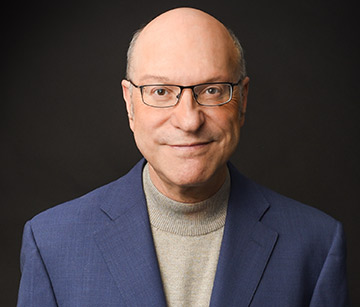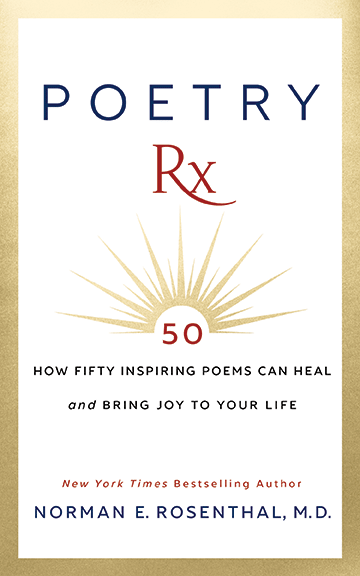“The spontaneous flow of the consciousness of the poet brings about more and more contrast in short expressions…. with this comes that fast pace of evolution.” —Maharishi Mahesh Yogi
For centuries, poems have offered lyrical vehicles for celebration and praise, love and longing, discovery and insight, comfort and solace. Now, in his latest book, the world-renowned psychiatrist and best-selling author Norman Rosenthal, M.D., has forged a love of poetry with his understanding of the human psyche into a balm for heart and soul in Poetry Rx: How 50 Inspiring Poems Can Heal and Bring Joy to Your Life (G&D, May 2021).
Suffering from a broken heart? To reclaim yourself, try “Love after Love” by Derek Walcott. The poem provides an antidote to feeling sad, lonely, and pessimistic, Dr. Rosenthal suggests, by embracing this as a time to renew your relationship with your self. “You will love again the stranger who was your self,” writes Walcott (48–52).1
Celebrating or aspiring to long-lasting marriage? Read Shakespeare’s Sonnet 116, “Let me not to the marriage of true minds / Admit impediments.” Dr. Rosenthal elucidates Shakepeare’s greatest sonnet as someone who has counseled many couples, reminding us that enduring partnership requires a meeting of minds and souls (71–73).
If you’ve lost a loved one, read “Stop all the clocks, cut off the telephone (Funeral Blues),” W. H. Auden’s poem made famous in the 1994 romantic comedy Four Weddings and a Funeral. Dr. Rosenthal unpacks the poem’s deceptive simplicity and powerful insights into the fracture in time caused by losing a life partner. One of the takeaways he offers is the ancient truth that it can be comforting to read about someone else’s experience of grief (77–81).
These poems offer a glimpse of the first part of Poetry Rx, Loving and Losing.
As New York Times health columnist Jane Brody wrote in “When the Doctor Prescribes Poetry” (April 12, 2021), “I used to believe that poetry did not ‘speak’ to me, but I now see how wrong I was…. The special beauty of Dr. Rosenthal’s book for me is his discussion of what each poem is saying, what the poet was likely feeling, and often how the poems helped him personally.”
You’re invited! May 25th virtual book signing with Dr. Rosenthal to support veterans ►
The poem provides an antidote to feeling sad, lonely, and pessimistic, Dr. Rosenthal suggests, by embracing this as a time to renew your relationship with your self.
A Prescription to Enjoy “These Beautiful and Ingenious Creations”
For each of the 50 poems collected here, Dr. Rosenthal offers his own experiences with the poem, personal and professional; the story of the poet and his or her writing of the poem; the delights of particular poetic strategies and forms, such as sonnets or villanelles; and suggestions for the Takeaways that follow each poem—with the caveat that “it is your interpretation rather than mine or anyone else’s that is important” (5).

Norman Rosenthal, M.D.
The main prescription of Poetry Rx is to empower us to engage with “these beautiful and ingenious creations” on our own terms: “As the reader, you complete the poem, in the process bringing your past experiences into the collaboration between you and the poet,” he writes. “Allow yourself to experience the wonder a poem provides when it opens up new spaces in which your mind can roam” (4).
Dr. Rosenthal illuminates The Inward Eye with canonical poems about nature and transcendence by William Wordsworth, Emily Dickinson, Robert Frost, and Gerard Manley Hopkins, among others. In The Human Experience he gathers poems that enact turning points such as leaving home or the importance of hope, reconciliation, accepting one’s emotions, and self-actualization.
In A Design for Living and the Search for Meaning, he provides poems of instruction on timeless truths such as remaining steady through ups and downs (Rudyard Kipling’s “If”), never giving up (William Ernest Henley’s “Invictus”), and holding on to your dreams (Langston Hughes’ “Dreams”).
In the last section, Into the Night, he takes up aging and facing death, including whether you should just go for it (“An Irish Airman Foresees His Death” by William Butler Yeats), aging by degrees (“I Know I Am Getting Old” by Wendell Berry), or dying too soon (“We Real Cool” by Gwendolyn Brooks).
“Allow yourself to experience the wonder a poem provides when it opens up new spaces in which your mind can roam.” —Dr. Norman Rosenthal
Discovering the Power of Poetry to Lift One’s Mood
Dr. Rosenthal’s journey to create this innovative approach to healing began when a friend who had just experienced a devastating loss called him late one night. As they spoke about the grieving process, they ended up reading Elizabeth Bishop’s poem “One Art,” which famously begins, “The art of losing isn’t hard to master,” and concludes, “though it may look like (Write it!) like disaster” (9).
The effect of sharing this poem was immediate, Dr. Rosenthal recalled when we spoke. “His mood lifted palpably, and so did mine.” This observation immediately captured the interest of Dr. Rosenthal, who is best known for defining seasonal affective disorder (SAD) and pioneering the use of light therapy for its treatment.
“I’m in the business of studying mood and what can make it better, and here is something unexpected, that made his mood and mine better,” he explained. “I thought, wow, I’ve seen bright lights perk people’s mood up in ways that hadn’t been appreciated or described. Now here I am again, seeing something that’s novel.”
So began a years-long project for the psychiatrist, who had loved poetry since he was a boy. Now he collected and utilized poems in his clinical practice, gradually writing this book to take readers on a journey of insight and self-healing through poetry—and without side effects.
“I’m in the business of studying mood and what can make it better, and here is something unexpected, that made his mood and mine better.” —Dr. Norman Rosenthal
The Gift of TM Practice to Help Fulfill Your Dreams
Dr. Rosenthal credits the “twice-a-day stillness” of his TM practice with allowing the idea for Poetry Rx to unfold. As the author of two best-selling TM books, Transcendence: Healing and Transformation through Transcendental Meditation and Super Mind: How to Boost Performance and Live a Richer and Happier Life through Transcendental Meditation, he has a profound understanding of the TM technique from the points of view of both meditator and scientist.
“Poetry Rx could not have been written without my TM practice. My practice has infused in me an ability to sit with the problem. It’s like watching crystals grow. You’re seeing things come together,” he said.
When Dr. Rosenthal began collecting poems he thought could help people, the book “hadn’t jelled yet. It’s still floating out there in the sea, and I’ve got to gather it all together in a net so it’s something that I can take home. That’s where TM forms its magic. It gives me that space,” he recalled, leading him to pull together the whole with the idea of 50 poems.
His TM practice also helped him persevere. Despite nine previous books—two of which were New York Times bestsellers—three agents and the publishers of his prior successes turned down his proposal. “Poetry isn’t going to sell. Nobody’s interested in poetry,” they told him.
“TM has allowed me to be my own guide. It has allowed me to hold my dreams.” —Dr. Norman Rosenthal
But Dr. Rosenthal felt this book would be valuable in a new way: “It’s not only an anthology or a collection of poems; it’s what poetry can teach us. It’s a guidebook, whereby I take the reader by the hand and I say, ‘This is how this poem can help you.'”
He added that, “TM has allowed me to be my own guide. It has allowed me to hold my dreams. TM has allowed me to develop the organization needed to get a book like this written. It’s been step by step from Transcendence to The Gifts of Adversity to Super Mind, and now to this. I could not have done these things without TM. I think of consciousness as a river flowing over the river bed and smoothing out the stones.”
Seeing the Dynamic Depths of Wordsworth’s “Daffodils”
Dr. Rosenthal also shared that being a regular TM meditator has allowed him to see subtle poetic dynamics and effects that he hadn’t seen before. He wondered, for example, why Wordsworth’s “Daffodils,” the lead poem in the The Inward Eye section, has been an all-time favorite for over two centuries. His reading guides us to freshly experience and understand why this universal poem continues to delight (101–108).

“A host, of golden daffodils… Fluttering and dancing in the breeze.” —William Wordsworth
“We who are TM meditators know that transcendence is sometimes experienced as pure crystal clear consciousness, and other times it’s a dynamic, vibrant state of inner life. And as we meditate regularly over time, that inner stillness carries into our daily activity more and more. If you look at Wordsworth’s ‘Daffodils,’ you will see the alternation between these states,” said Dr. Rosenthal.
The poem begins with a feeling of quiet transcendence, he explained: “I wandered lonely as a cloud / That floats on high o’er vales and hills.”
Then there’s a transition: “When all at once I saw a crowd, / A host, of golden daffodils” beside the lake. The pace picks up with the daffodils “Fluttering and dancing in the breeze.”
Dr. Rosenthal elucidates how the poem goes on to alternate between silence and dynamism: “Now there’s a vibrance, now a slowing down. For example, the lines ‘Continuous as the stars that shine / And twinkle on the Milky Way’ are quiet, peaceful, unmoving. Then the poet sees the daffodils ‘Tossing their heads in sprightly dance.'”
This alternation culminates in Wordsworth’s famous closing stanza:
For oft, when on my couch I lie
In vacant or in pensive mood,
They flash upon that inward eye
Which is the bliss of solitude;
And then my heart with pleasure fills,
And dances with the daffodils. (102)
“The alternation between peaceful contemplation and vibrant experience of nature fascinates me,” Dr. Rosenthal said. “What seems very simple on the face of it, is actually resonating very deeply with our experience of consciousness. Now, if I hadn’t been transcending and meditating all this time, I wouldn’t even feel that difference in the change of subject matter and that change of pace.”
Enlivening the Evolutionary Effect of Poetry
In a 1976 talk, TM Founder Maharishi Mahesh Yogi discussed how poetic expressions create evolutionary effects2 exactly by alternating and contrasting rest and activity:
“So the spontaneous flow of the consciousness of the poet brings about more and more contrast in short expressions. The charm of poetry grows when they are close together and are highly contrasting in their values—very great contrasts put close together—and with this comes that fast pace of evolution. The mechanics of the evolutionary process go through activity and rest and activity and rest. This cycle of activity and rest occurs on several levels, on the level of the flow, on the level of meaning, and on the level of sound.” —Maharishi (64-65)
In Poetry Rx, Dr. Rosenthal powerfully enlivens the evolutionary impact of poetry for readers, which Maharishi describes:
“The totality of the value of literature lies in raising that unified awareness, where one comprehends in a natural way, without any effort, the great contrasts: light and darkness, the mountains and the rivers, the ripples and the ocean—great contrasting values comprehended in a very natural way and made use of in evolution. It is a great ability of evolution that gets enlivened, that potentiality of evolution gets enlivened, and this is the blessing of literature.” (74)
“It is a great ability of evolution that gets enlivened, that potentiality of evolution gets enlivened, and this is the blessing of literature.” —Maharishi
Order your copy of Dr. Rosenthal’s Poetry Rx ►
You’re Invited to a May 25th Virtual Book Signing to Support Veterans!
Dr. Rosenthal will be featured at a virtual author event on May 25, 7:00 p.m. CDT, at Prairie Lights bookstore in Iowa City. This event is co-sponsored by the David Lynch Foundation (DLF); 100 percent of the author’s book sale proceeds from this event will go to DLF’s Resilient Warrior Program to help reduce the epidemic of suicides among U.S. military veterans.
“Donating book sale proceeds from Poetry Rx will enable veterans to participate in DLF’s Resilient Warrior program, which has saved thousands of veterans’ lives and restored happiness and hope,” Dr. Rosenthal says.
Register in advance for this virtual book signing with Dr. Rosenthal ►
Notes



Comments
you may also like
The Arts
The Healing Power of Poetry | 51:18
Norman Rosenthal, M.D., world-renowned psychiatrist, researcher, and best-selling author, talks about his latest book, Poetry Rx, and how the sounds, rhythms, and ideas in poems can heal, inspire, and bring joy. He also talks about the impact of his daily TM practice on his work and writing.
Maharishi
The Truth about Creativity and Suffering
Is suffering necessary to create? Maharishi explains the real relationship between creativity and suffering in this talk collected in The Flow of Consciousness: Maharishi Mahesh Yogi on Literature and Language.
Enlightenment Series
Walt Whitman, America’s Seer
The great poet gives us glimpses of Transcendental and Cosmic Consciousness in Dr. Craig Pearson’s popular collection The Supreme Awakening: Experiences of Enlightenment Throughout Time—And How You Can Cultivate Them.
Better Health
The Super Mind for Coping with Intense Change and Challenge | 51:12
Norman Rosenthal, M.D., renowned psychiatrist, best-selling author, and Clinical Professor of Psychiatry, Georgetown University, was the first to describe Seasonal Affective Disorder (SAD). In his second TM Talks visit, he reviews how times of crisis open doors for growth, then focuses on how daily TM practice leads to the full development of human potential.